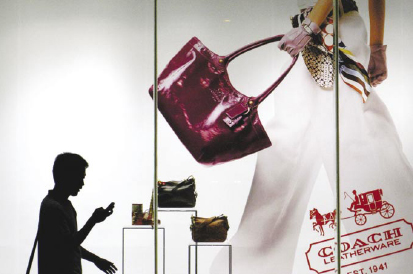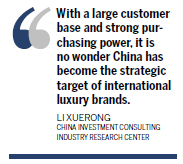Business
Chinese penchant to show off fuels demand for luxury items
(China Daily)
Updated: 2010-08-27 16:51
 |
Large Medium Small |
|
 Luxury products such as Coach has become necessities of daily life of wealthy Chinese and their children. Xiao Yi/For China
Daily
|
BEIJING -Several months ago, Wei Yi dug deeply into her savings to buy a 3,000-yuan ($441) leather bag by the US brand Coach as a wedding gift for her friend.
"It's necessary for young people to have a couple of luxury items," said Wei, 28, a student at University of International Business and Economics in Beijing.
"I picked the bag because it is a good brand and it matches various dressing styles."
Wei, who said she had used money saved from her parents and part-time jobs to buy the bag, is just one of about 20 million in China who are driving the country's booming luxury market that now ranks second in the world, after Japan, in terms of sales.
The Chinese magazine Sanlian Lifeweek said that in the next five years, the number of potential luxury customers in China could climb to 160 million.
And research released by China Investment Consulting Industry Research Center (CIC) showed that at the end of last year, total sales in China's luxury market hit $9.4 billion, 27.5 percent of the world's total.
Bain & Co, a management consulting firm, said sales of luxury goods in China grew by 12 percent last year. And within five years, it predicts China will be the world's top luxury market, with sales worth $14.6 billion.
One reason for the flourishing market is the rise of the Chinese nouve riche, the core customers for luxury products.

"To wealthy Chinese and their children, these expensive goods are necessities of their daily life," said Li Xuerong, CIC's chief analyst.
The 2010 Hurun Wealth Report shows there are 875,000 people worth more than 10 million yuan ($1.47 million) each in China, an increase of 6.1 percent from last year.
On average, each of them owns three cars and 4.4 luxury watches and spends 1.7 million yuan every year.
Another reason is that traditional luxury markets in Western countries have been sluggish due to an economic downturn.
"During the financial crisis, the luxury market in Europe and North America experienced a sharp decline of 20 percent to 30 percent," Li said.
"However, China, which was less influenced by financial tsunami, still recorded a growth in luxury goods consumption."

Last year, Moet Hennessy Louis Vuitton, the international group that owns more than 50 luxury brands including Louis Vuitton, Givenchy and Dior, reported a net profit of 1.76 billion euros ($2.22 billion), down by 13.4 percent from 2008.
"With a large customer base and strong purchasing power, it is no wonder China has become the strategic target of international luxury brands," Li said.
The rich in China view luxury items a little differently than their counterparts in the mature luxury markets of the West, with CIC data showing that more than half are bought as gifts.
"Giving presents is part of Chinese culture," said Zhu Mingxia, director of Cheungkei Research Center for Luxury Goods and Service, University of International Business and Economics in Beijing.
She said gifts have long been part of social interaction and luxury goods have now become very suitable.
"They are expensive, with high quality and well known all over the world," she said. "Such gifts would thus show sincerity and respect, and improve personal relationship."
Conspicuous consumption is another prominent characteristic, with the Chinese preferring goods with distinctive and well-known logos or a higher prices, so that they could be easily recognized.
Zhu said that since brand awareness is still not as high as that in the West, better-known brands such as Louis Vuitton have become more popular.
"There are three stages in the consumption of luxury goods: to show off, to appreciate and to feel," she said.
Most Chinese are still in the first stage and items such as bags, watches and cars that can be shown off are still the first choice.
"To them, luxury products are like the ID cards for wealth," she said. "It does not matter what the brand culture or history is. Most of them just follow the trend."
Zhu said Chinese customers are gradually becoming more rational about luxury consumption, but their desires will not be reduced.
To raise awareness and increase market share, some international brands have opened stores and have started to buy out their distributors.
Over the past two years, Coach, for example, completed a phased acquisition of its domestic retail businesses in Hong Kong, Macao and the mainland from its distributor, the ImagineX group.
Coach's annual report said that in September 2008, it bought out eight stores in Hong Kong and two in Macao. On the mainland, the acquisition, involving 15 stores, was completed in April last year.
This year, the company plans to open up to 15 new stores in China.
Zhu said that with an expanding market share and customer base, such companies are looking at ways to avoid diluting the brand value.
They have to keep high prices while appealing to more customers - but not too many customers.
"If most people could afford their products, their brand value would be jeopardized," she said.
"Scarcity is the most essential element of luxury products."
CHINA DAILY